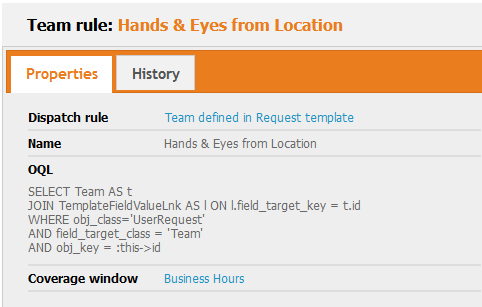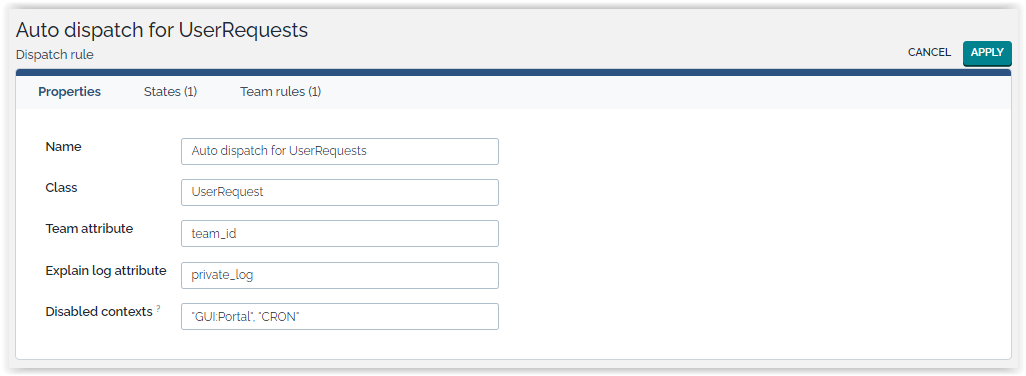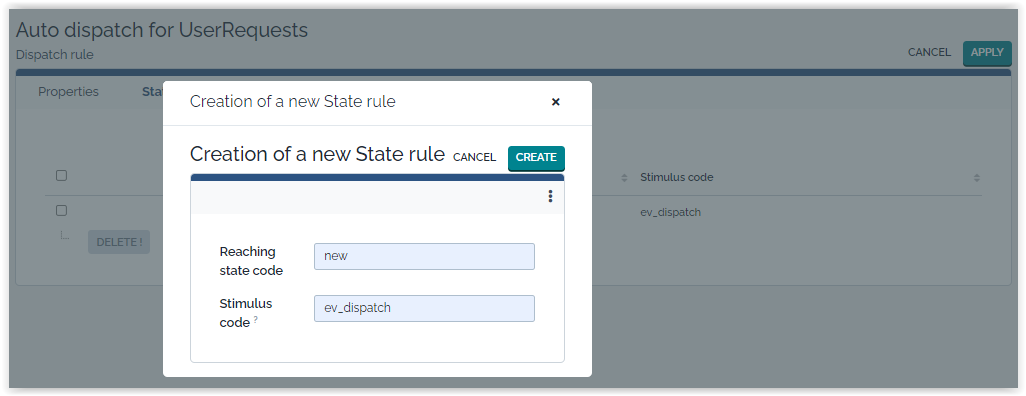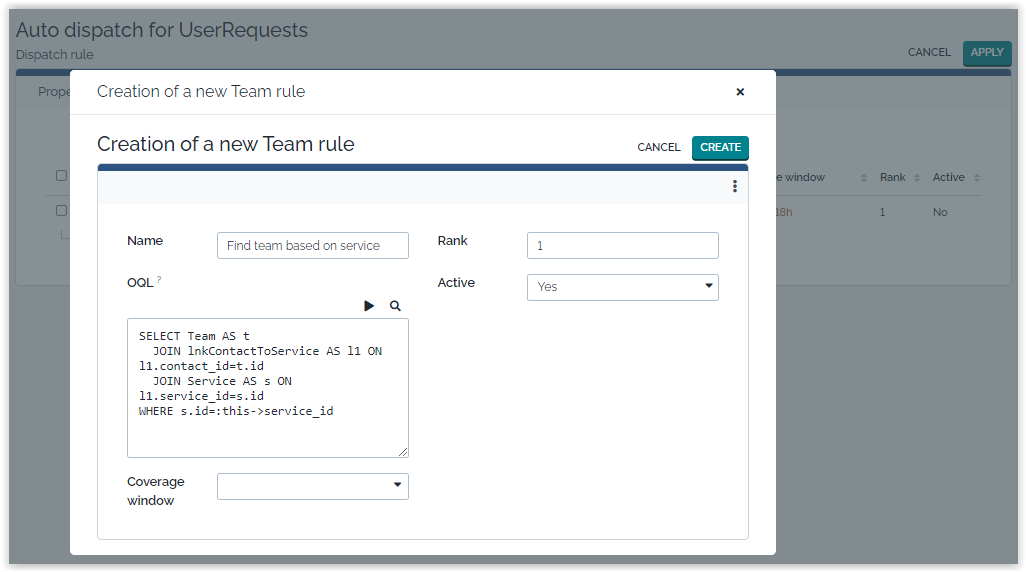Auto dispatch ticket to a team
- name:
- Auto dispatch ticket to a team
- description:
- Automatically dispatch tickets based on the configurable OQL rules.
- version:
- 1.1.0
- release:
- 2025-01-25
- itop-version-min:
- 3.2.0
- code:
- combodo-autodispatch-ticket
- state:
- stable
- diffusion:
- iTop Hub
- php-version-max:
- PHP 8.3
Automatically dispatch tickets to teams when entering a state.
Features
Allow to dispatch automatically Ticket based on
predefined Dispatch rules, to a team
and trigger a transition.
Each time a Ticket enter a state, iTop searched for
Dispatch rules which apply to this class and state. If
it finds one, then it uses each Team rules in order to
retrieve a team. The Ticket is assigned to the first team found and
Ticket is moved to a different state. If no team is found, the
Ticket is left unchanged.
Example: when a Ticket is created, it is automatically dispatched to the team with role 'Support level1' defined on the customer Delivery Model, and moved to status 'Dispatch'.
This extension allows to define:
-
different rules for different sub-class of Ticket,
-
ordered queries to retrieve the team to use,
-
force an automatic transition, if a team was set (thus triggering notification)
-
customer of the ticket
-
service or sub-service of the ticket
-
location of the caller
-
current time and applicable coverage windows
-
or any other logic you may need…
And any combination of those.
Revision History
| Date | Version | Description |
|---|---|---|
| 2025-01-25 | 1.1.0 | * N°2113 - Allow customization of the logic which
hide buttons on object creation when dispatch rules apply * N°7932 - Add english (GB) translation to iTop * N°8016 - Replace iApplicationObjectExtension and DBObject methods override by Events iTop 3.2.0 required |
| 2024-07-30 | 1.0.14 | * N°2255 - Improve usability and support of
Dispatching rules * N°6355 - Improve tooltips and integrity checks on Dispatch rules * N°6591 - Keep “Dispatch” buttons in disabled contexts of dispatch rule and outside of creation * N°6680 - Sorting class TeamRule by rank * N°7696 - Update german translations thanks to @Attila0428 |
| 2023-07-13 | 1.0.13 | * N°5488 - Improve error message for invalid DM
class in auto-dispatch rules * Updated german translations by Lars Kaltefleiter |
| 2022-03-17 | 1.0.12 | * N°4967 - don't update if no modification |
| 2021-12-20 | 1.0.11 | * Update ES translations |
| 2020-03-06 | 1.0.9 | * Update DE translations |
| 2019-06-16 | 1.0.8 | * When team rules return no team and ticket is not
dispatched, don't log success in ticket's log * When a stimulus is not applicable, log the error and pursue the object's operation * Fix inactive target rules being used for matching * Fix a bug when creating coverage window within a dispatch rule |
| 2019-03-19 | 1.0.7 | Fix dispatch rule not working for Tickets created by a user with silos |
| 2019-01-17 | 1.0.6 | Add Combodo license |
| 2018-12-07 | 1.0.4 | Update translations |
| 2018-06-26 | 1.0.3 | Fix english translation |
| 2017-10-27 | 1.0.2 | Added German translation. (thanks to ITOMIG GmbH) |
| 2017-09-26 | 1.0.0 | First official version. |
Limitations
This extension is executed after combodo-approval-light or combodo-approval-extended, therefore if an Approval rule changes the object's state, Dispatch rules that should have been applied on the previous state will not be computed.
Dispatch rules must be defined on each final class, not on abstract class. This extension is not designed to set a team without changing the state.
Requirements
-
iTop 3.2
-
Extension SLA considering business hours v2.1 or more
Installation
Use the Standard installation process for this extension.
Configuration
This extension does nothing out of the box, until you have
created Dispatch rules to express when a Ticket should
automatically assigned to a team and which team to use.
Dispatch Rule
A dispatch rule is defined for one Class of Ticket.
It must contain at least one Team rule and one
State rule.
First create a new Dispatch rule by opening the corresponding menu under Service Management.
| Name | Mandatory | Description |
|---|---|---|
| Name | Mandatory | A name describing the dispatch rule |
| Class | Mandatory | Ticket class the rule will apply to |
| Team attribute | Mandatory | Attribute code of the Ticket Class that will be set by the matching Team rule |
| Explain log attribute | Optional | Attribute code of the Ticket Class that will be set with a text explaining how a Team rule matched |
| Disabled contexts | Optional | A CSV list of context tags in which the Dispatch rule will be inactive. Typically a portal (“GUI:Portal”), cron tab (“CRON”), a rest/json call (“REST/JSON”), … |
State Rule
A State rule defines the state in which you want to
auto-assign a team, and which transition must be applied if a team
was found.
Create at least one State rule in the States tab.
| Name | Mandatory | Description |
|---|---|---|
| State code | Mandatory | Code of the Ticket state. Entering this state will trigger the Dispatch rule |
| Stimulus code | Mandatory | Code of the Stimulus that will be applied if a team is found |
Team Rule
A Team rule defines how to retrieve the team to
assign.
Create at least one Team rule in the corresponding tab.
| Name | Mandatory | Description |
|---|---|---|
| Name | Mandatory | Free name of the rule, for humans. |
| OQL | Mandatory | Query which must return Team objects |
| Coverage window | Optional | The Team rule will be used only if we are within the Coverage window |
| Rank | Mandatory | Order for using the Team rules, lowest number first. |
| Active | Mandatory | Allow to prepare Team rules, without activating them. Rules with 'No' will not be used. |
Examples of usage
Criteria to assign a team
Remember that, there is a filter on Ticket.team_id:
SELECT Team AS t JOIN lnkDeliveryModelToContact AS l1 ON l1.contact_id=t.id JOIN DeliveryModel AS dm ON l1.deliverymodel_id=dm.id JOIN Organization AS o ON o.deliverymodel_id=dm.id WHERE o.id = :this->org_id
Default Team
In beta version of auto-dispatch, iTop assigned a team using this logic
SELECT Team AS t JOIN lnkDeliveryModelToContact AS l1 ON l1.contact_id=t.id JOIN ContactType AS ct ON l1.role_id=ct.id JOIN DeliveryModel AS dm ON l1.deliverymodel_id = dm.id JOIN Organization AS o ON o.deliverymodel_id=dm.id WHERE o.id=:this->org_id AND ct.name='Support level1'
Assigning a team based on Service
You may want to define a support team per Service,
in which case, the easiest is to link the applicable team
to each Service and ensure that always one and one
only team is linked to each service.
SELECT Team AS t JOIN lnkContactToService AS l1 ON l1.contact_id=t.id JOIN Service AS s ON l1.service_id=s.id WHERE s.id=:this->service_id
The best would be to add a new attribute
support_team_id on Service, as an ExternalKey
to a Team.
You may want to use the team defined on the Service when there is one, otherwise use the default team defined on the delivery model of the customer. In which case you will create 2 Team rules, one based on Service with the lowest rank and the other using the OQL above.
Disabled contexts
In some case you want to disable the Auto-assignment mechanism.
For example, it is quite common that you want to Auto-Dispatch
tickets created by users through the Portal, Ticket creation from
Email, but do not want to do it, when the ticket is created by a
synchro, a script or maybe an agent in the console.
That's the purpose of the Disabled contexts field.
It is even possible to disable a Dispatch rule just for one particular Portal or a particular DataSynchro. The syntax to use is:
-
Portal:<portal-id>where<portal-id>is the portal id defined in the XML -
Synchro:<synchro-name>where<synchro-name>is the name of that particular Datasynchro
Examples: Let's say you have created a special portal for your agents and you want Tickets created through that portal not to be auto-dispatched.
<portals> <portal id="agent-portal" _delta="define"> ...
Then to disable the Dispatch rule, set Disabled
contexts = Portal:agent-portal.
Usage
This behavior is designed to prevent Dispatching rules to be workaround by an agent by mistake.
In order to manually dispatched or assign a Request, the agent will have to create the Request first, then to apply the wanted transition, using the transitions actions.
Questions & Answers
Q: Can I auto-assign the Ticket using a criteria set in
a Request template?
A: Yes if that criteria is an iTop object, so a
drop-down list Field, which values are defined by an OQL.
For example, if you have define a Request Template Field
location which propose the user to choose a site
SELECT Location within the Request Template
-
Then you have customized the Location class to add a
team_idexternal key to the Team class, representing the Hands & Eyes team for that location -
Then you want to automatically dispatch Ticket which do have a Request Template with a
locationField documented to the Hands & Eyes team for that location -
Then define a
Team rulewith this OQL
SELECT Team AS T JOIN Location AS L ON L.team_id = T.id JOIN TemplateFieldValueLnk AS F ON F.field_target_key = L.id WHERE F.obj_class='UserRequest' AND F.field_target_class = 'Location' AND F.obj_key = :this->id AND F.field_code = 'location'
In the picture below, it's even simpler, we use the Team
provided by the Request Template as soon as there is one 
Q: Can I prevent the ev_assign / ev_dispatch transition
buttons to be hidden on User Request creation as soon as a dispatch
rule exists?
A: Yes, also this behavior has a real purpose, if
an automatic dispatch rule applies to the Request under creation,
it will be applied before the transition requested by the user,
transition which will then fail with an error message.
- itop-design
-
<event_listeners> <event_listener id="AutoDispatchRule_HideTransitions" > <code _delta="redefine"><


